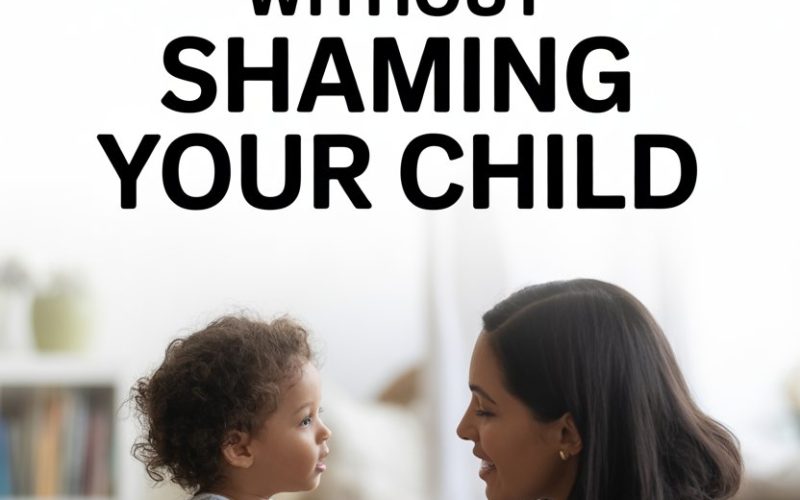Parenting: that magical journey where you oscillate between “I’ve got this” and “Where do I hand in my resignation?”
Discipline is essential, but those old-school tactics – raised voices, pointed fingers, “What were you thinking?!” – can leave scars that last well after the tantrum fades.
Turns out, you can guide your child’s behaviour, even on a time crunch, without making them feel two inches tall.
Here’s how to trade shame for skills, and power struggles for actual progress.
Why Shame Doesn’t Work (And What It Does Instead)
You probably already feel a pang in your stomach when you hear yourself snap, “Why can’t you listen for once?”
Parents have been there, fuelled by exhaustion and the hope that maybe, just maybe, tough words will spark a mini-epiphany.
Unfortunately, researchers found that shaming actually increases anxiety, resentment, and more misbehaviour down the line.
Shame teaches kids the message, “There’s something wrong with me,” instead of, “I made a mistake, and I can fix it.” That’s a heavy backpack for any child to lug around.
The Power of Connection: Your Secret Weapon
Discipline means to teach, not to punish. When your child mucks up (as all children do – and teens, and let’s be honest, adults), connection is your best ally.
This isn’t about coddling. It’s about making sure your child feels seen, heard, and safe, even when you’re less than impressed with their behaviour.
A child who feels secure is far more likely to listen, apologise, and try again.
Attachment researchers have shown kids who feel emotionally secure with their parents are more resilient, better at managing emotions, and yes, less likely to need a time-out for launching the cat off the sofa.
Speak to the Behaviour, Not Their Worth
Stating the obvious: “You’re a naughty boy” isn’t exactly the motivational speech of the year. Even “You’re being so lazy” lands with a thud. Kids can’t separate the behaviour from their identity, especially when they hear these messages on repeat.
Try: “You didn’t put your dishes away, and now the ants are having a feast. Next time, let’s get them to the sink straight away.”
Specific, actionable, and about the dishes – not your child’s character.
Name Your Own Emotions (Without the Guilt Trip)
Ever notice how your irritation can escalate things faster than a toddler discovering sugar?
Kids are emotional detectives. When you’re honest about your feelings – “I feel frustrated when shoes are left lying around because I trip over them” – you’re modelling vulnerability and opening the door for problem-solving.
This is miles more effective than, “You never listen! Why do I bother?”
It’s the difference between a guilt trip and a GPS.
Make Room for Mistakes (Theirs and Yours)
Perfection is about as realistic as a unicorn in the school car park.
When your child messes up, remind them (and yourself) that mistakes are how we learn. “Everyone forgets things sometimes. What do you think will help you remember next time?”
And if you lose your cool? Apologise. “I shouted and I shouldn’t have. I was stressed, but that doesn’t make it okay. Let’s try again.”
A dose of humility never hurt anyone. Plus, you’re showing your child how to own up without shame.
Consequences That Actually Teach
Natural consequences often do the heavy lifting for you.
If your five-year-old refuses to wear a coat, chances are a brisk walk to school will do the reminding for you – no lecture required. If your teenager ignores curfew, maybe the next outing gets cut short.
The trick: let the consequence relate to the behaviour and be delivered without sarcasm or a heavy hand.
Experts at the Centre for Parenting Education say consequences should be reasonable, respectful, and reveal the natural link between action and outcome.
Set Boundaries With Compassion (And Consistency)
Boundaries are not just rules you recite ten times before breakfast. They’re limits that show your child you care enough to keep them safe.
“Screens go off at 7pm. I know it’s hard to stop when you’re having fun. If you need help, I can set a timer.”
Sure, you’ll get pushback. (Stifle your eye roll now.) But when you stick to firm, fair boundaries, your child learns that structure is reliable – not arbitrary punishment.
Explain The Why (Even If It’s Obvious to You)
Ever muttered, “Because I said so” only to be met with a withering look? Trust me, your child isn’t just being cheeky – they genuinely want to make sense of your rules.
Explaining your reasoning doesn’t mean you’re negotiating bedtime every night, but it does show respect.
“Brushing your teeth keeps them healthy. You don’t have to like it, but it’s important.” No one’s asking you to launch into a TED Talk; just a quick, honest explanation builds trust.
Encourage Self-Reflection, Not Self-Criticism
Reflection is the cousin of shame, minus the emotional baggage. After a meltdown, resist the urge to lecture. Try, “Can you tell me what happened?” or “What could you do differently next time?”
You might get a blank stare or a shrug. That’s okay. Give them space to think, and if they aren’t ready to talk, let them know you’re available.
The goal is to help your child connect the dots between actions and consequences, not to shame them into submission.
Praise Effort, Not Just Success
“Good job!” is nice, but “I saw how hard you worked on that maths problem, even when it was tricky” helps your child focus on effort, persistence, and growth – not just getting it right.
Why does this matter?
Growth mindset research shows kids praised for effort are more likely to tackle challenges… and less likely to collapse in a puddle of shame when things go sideways.
Take Care of Yourself (Seriously, It Matters)
You can’t pour from an empty cup, as every self-help meme will remind you. Exhausted, stressed-out parents are far more likely to yell, shame, or react harshly.
Call in reinforcements, swap stories with mates, say yes to that cup of tea.
Even five minutes can help you reset – which means you’re more likely to respond instead of react the next time the crayon mural appears on your living room wall.
When You Need Backup: Professional Help Isn’t a Failure
Sometimes, no matter how many gentle discipline tricks you try, things stay stuck.
If your child’s behaviour is extreme, or if you’re struggling to keep your own reactions in check, don’t tough it out alone. Family therapists and parenting coaches can help you reset patterns, not just manage symptoms.
Asking for support isn’t waving a white flag; it’s giving your family access to new tools for a happier, less shame-filled home.
Raising Kids With Confidence, Not Criticism
Discipline isn’t about squashing your child’s spirit (or your own). It’s about building skills, setting boundaries, and showing your child – even on your most frazzled days – that mistakes are part of the deal.
Next time you’re tempted to drop a shame bomb, pause. Speak to the behaviour, not the person. Connect before you correct.
And when in doubt, remember: a little empathy, a sprinkle of honesty, and the occasional deep breath can go a remarkably long way.
No one gets it right all the time. But with a little practice, you’ll find your way to discipline that teaches, not tears down.
And your child? They’ll thank you – eventually, probably when they’re old enough to have kids of their own.




